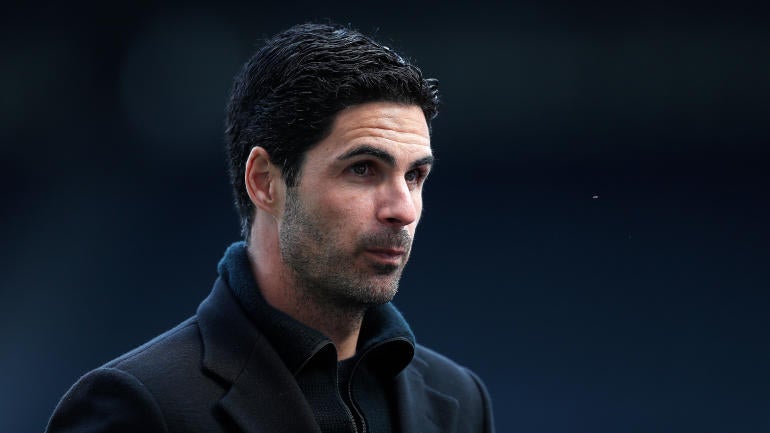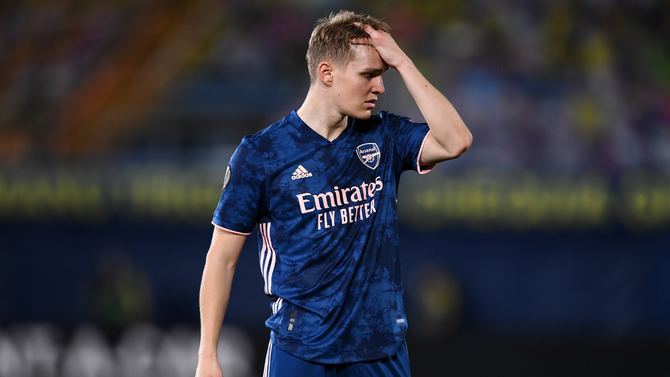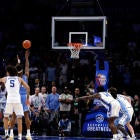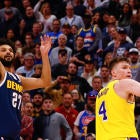
It is becoming an increasingly familiar season finale at the Emirates Stadium: win or bust in their pursuit of European competition. If Arsenal's recent history were the work of a scriptwriter critics would tear it apart for the bizarre plot twists in midseason that consistently contrive to end with their season teetering on the brink of glory or disaster.
At least under Arsene Wenger and Unai Emery it was a case of Champions League glory versus the relatively slim pickings of Europa League. Mikel Arteta's two seasons with Arsenal have descended into all or nothing: first a late season sprint to FA Cup number 14 and qualification for Europe, now a Europa League semi-final that could be the difference between Champions League qualification or no continental football at all for the first time since 1995.
That is not his fault alone. For a rookie manager at a top club, Arteta has been handed a string of off-field crises the likes of which many veterans have never navigated. The Spaniard was the one of the first high-profile figures to catch COVID-19 in the United Kingdom, presided over the final months of the Mesut Ozil schism and has managed amid executive level turbulence that has reached its pinnacle (so far) with the fallout from the Super League and the takeover bid from Daniel Ek.
It is all enough to take the spotlight away from what is the biggest game of his fledgling coaching career. Overcome a 2-1 first leg deficit to Emery's Villarreal and win the final, likely against a Manchester United side Arteta is unbeaten against in three meetings, and Arsenal's grail quest is complete after four years away from the Champions League.
Craving even more coverage of the world's game? Listen below and subscribe to ¡Qué Golazo! A Daily CBS Soccer Podcast where we take you beyond the pitch and around the globe for commentary, previews, recaps and more.
Immediately the tenor of their project changes. Their absence from the competition has taken an emotional and financial toll on the club and its current owners, Josh Kroenke memorably noting in 2019 that Arsenal had "a Champions League wage bill on a Europa League budget".
The pursuit to make them a Champions League club again has meant no tightening of the belt, indeed almost the opposite. The Gunners broke their club record to sign Nicolas Pepe for $100million weeks after Kroenke gave that quote. The following summer he and his father helped to finance the paying in full of the $60million release clause in Thomas Partey's Atletico Madrid contract. Willian was also signed to a sizeable three year contract that Chelsea would not offer him. That none of these signings have been unqualified successes speaks to a sense of desperation that has engulfed the club's pursuit of Champions League football, a desire to just spend their way back into the competition in the hope that it will plug the gaps that were opening up in their finances even before the coronavirus pandemic.
As chief executive Vinai Venkatesham acknowledged in 2018: "We do have a self-sustaining business model so the more years you spend out of the Champions League the bigger strain it puts on the business model." If the club have inched away from that approach in recent years it is only because of the challenges that come when attempting to live within your means and simultaneously overhauling at least two of Manchester City, Manchester United, Liverpool, Tottenham and Chelsea.
Champions League qualification would provide rocket fuel to Arteta's rebuild and repair some of the damage done to the club coffers. According to football-coefficient.eu Arsenal would make $19.8million if they bow out at the semifinal stage of the Europa League. Hungarian champions Ferencvaros will earn more than that after taking one point from six Champions League group stage matches. The Gunners' Premier League rivals are taking home far more in the top tier competition, where Liverpool are set to claim $84million for reaching the quarterfinals.
Those funds would not necessarily all go into a transfer war chest, nor does not qualifying for the Champions League mean Arteta has to rebuild his squad on the cheap. CBS Sports reported last month that the Kroenkes had indicated a willingness to offer similar financial backing this summer to that which secured Partey last. But being back at the pinnacle of European football opens up new avenues to this club in terms of recruitment, sponsorship and prestige.
In a guarded press conference Arteta was reluctant to speak at great length about what winning this game and the competition could mean for his summer plans but he did at least acknowledge the value of silverware: "What I can say is that winning always helps for the future. It's the best way to prepare anything for the future."
Equally failure in this year's boom or bust competition would be all the more damaging than last summer's FA Cup. Arteta had a free pass for much of the failings of that league season, one that he began in 10th position and ended in eighth. Now Arsenal are ninth, five points off a European place having played a game more than Liverpool in seventh.
There remain mitigating circumstances in abundance. He has not had a full pre-season and the squad he inherited was in such desperate need of an overhaul that technical director Edu effectively paid individuals to go away in January of this year.

Since Christmas there have been signs of progress in their underlying metrics at both ends of the pitch but they have been spoiled by individual errors that Arteta said ahead of the game are "almost impossible" to coach out of players. That is perhaps true but when Arsenal have made 14 errors leading to shots and eight to goals in the Premier League and Europa League this season it is hard not to ask whether the manager could have done more.
Certainly that is a question that is being muttered with some regularity by Arsenal supporters even if social media is not a perfect representative of modern fandom. Arteta has frequently noted how much harder his job has been without a packed Emirates Stadium but considering how the air of frustration and rancour cost Emery his job in 2019 there might have been moments when he would have been relieved that his players were performing in front of an empty house.
Even if Arteta falls short in the Europa League he retains the backing of ownership and executives who view him as the man for the long haul. Equally those same individuals did not take long to pivot away from backing Emery to moving him on when it became clear that fans had their doubts.
Arteta is expected to lead Arsenal into the 2021-22 season regardless of how this campaign ends but failure to qualify for any form of European competition will mean that the young head coach is fighting to convince the wider world of his work rather than building on more solid foundations. In such circumstances it is hard to overstate the importance of Thursday's second leg.
That may yet be good news for the manager. When he has needed his side to come good for him they have more often than not: beating Manchester City and Chelsea to clinch the FA Cup, winning against the latter to ease pressure on him after Christmas and their impressive second leg performances against Benfica and Slavia Prague in this competition. On those occasions Arsenal have offered tantalizing glimpses of what Arteta could achieve given time. A win at the Emirates on Thursday and Gdansk soon after would be crucial in justifying such an investment.
![[object Object] Logo](https://sportshub.cbsistatic.com/i/2020/04/22/e9ceb731-8b3f-4c60-98fe-090ab66a2997/screen-shot-2020-04-22-at-11-04-56-am.png)

















